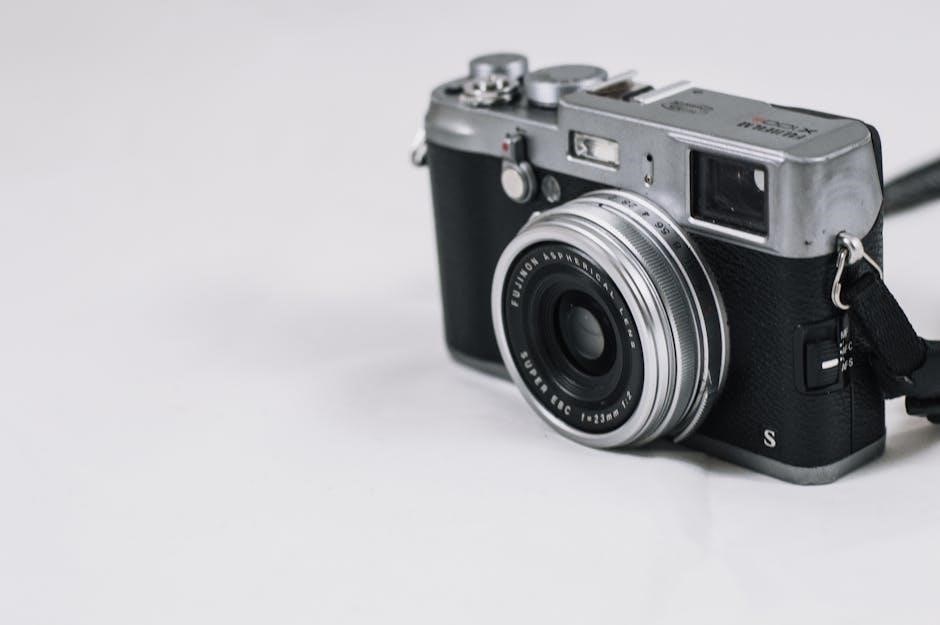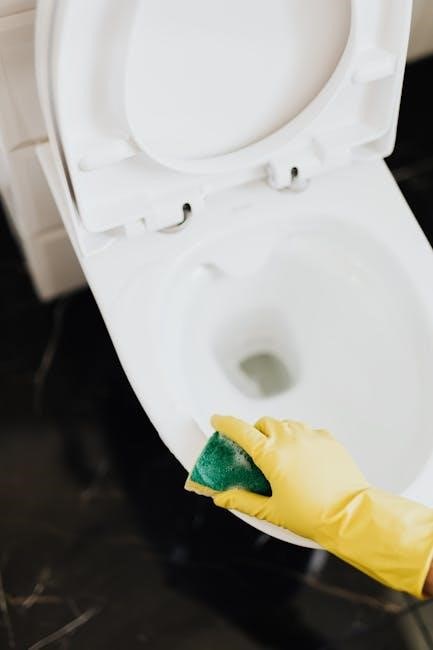The Frymaster manual is a comprehensive guide providing essential information on installation‚ operation‚ and maintenance. It ensures safety and efficiency in fryer usage.
Proper usage ensures optimal performance and longevity of the equipment.
1.1 Understanding the Importance of the Frymaster Manual
The Frymaster manual is crucial for ensuring safe and efficient operation of fryers. It provides detailed instructions for installation‚ daily use‚ and maintenance‚ helping users avoid common errors. By following the manual‚ operators can optimize frying results and extend equipment lifespan. It also serves as a troubleshooting guide‚ addressing potential issues and offering solutions. Compliance with the manual ensures adherence to safety standards and proper oil management‚ which are essential for environmental and operational efficiency.
Adhering to the manual guarantees optimal performance and safety in commercial frying operations.

Installation and Setup
The Frymaster manual provides a step-by-step installation guide‚ ensuring safe and efficient setup. Follow the instructions carefully to avoid errors and ensure proper equipment functionality.
Proper installation is key to optimal performance and longevity of the fryer.
2.1 Step-by-Step Installation Guide
The Frymaster manual outlines a detailed‚ step-by-step installation process to ensure proper setup and functionality. Begin by placing the fryer on a level‚ heat-resistant surface. Connect the unit to the appropriate electrical or gas supply‚ adhering to local safety codes. Follow the manual’s wiring diagrams and plumbing instructions carefully. Once installed‚ test the fryer to ensure all components function correctly. Refer to the manual for specific calibration and adjustment procedures. Proper installation ensures safety‚ efficiency‚ and optimal performance. Always consult a qualified technician if unsure about any step.
Correct installation is crucial for safe and efficient operation.
Operating Instructions
The Frymaster manual provides clear operating instructions for daily use‚ including temperature control‚ cooking cycles‚ and oil management. Follow guidelines for safe and efficient frying.
Proper operation ensures consistent results and equipment longevity.
3.1 Daily Operation and Cooking Procedures
Begin by powering up the fryer and setting the desired temperature. Ensure the oil level is adequate and preheat according to the manual’s guidelines. Load food baskets evenly‚ avoiding overcrowding. Start the cooking cycle and monitor the timer. For optimal results‚ adjust settings based on food type and quantity. After cooking‚ allow the fryer to cool slightly before filtering or draining oil. Regularly clean the basket and exterior to maintain hygiene. Refer to the manual for specific procedures‚ such as boil-out and oil filtration‚ to ensure consistent performance and longevity of the equipment.
Always follow safety precautions and recommended cooking times for best results.

Maintenance and Troubleshooting
Regularly clean the fryer and check oil levels. Troubleshoot issues like uneven heating or power failures by consulting the manual or contacting support. Schedule professional servicing annually.
Proper maintenance ensures safety and prolongs equipment life.
4.1 Regular Maintenance Tasks
Perform daily‚ weekly‚ and monthly maintenance tasks to ensure optimal fryer performance. Clean the fryer basket and drain oil regularly. Check and replace worn-out parts promptly. Schedule professional servicing annually for thorough inspection and repairs. Refer to the manual for specific instructions on maintaining your Frymaster fryer. Regular maintenance helps prevent breakdowns‚ enhances safety‚ and prolongs the equipment’s lifespan. Always follow the manufacturer’s guidelines for best results.
4.2 Common Issues and Solutions
Address common fryer issues promptly to maintain efficiency. Oil not heating? Check thermostat settings and electrical connections. If the fryer isn’t turning on‚ ensure it’s properly plugged in and the circuit breaker isn’t tripped. For clogged drains‚ clean the drain valve and pipes. Excessive smoke may indicate overheating—lower the temperature and ensure proper oil levels. Refer to the troubleshooting section in the Frymaster manual for detailed solutions. Regular maintenance can prevent many of these issues‚ ensuring smooth operation and prolonging the fryer’s lifespan. Always follow safety guidelines when resolving problems.

Safety Precautions
Always follow safety guidelines to prevent accidents. Avoid storing flammable substances near the fryer. Use protective gear like gloves and goggles. Ensure proper installation by qualified professionals only.
5.1 Essential Safety Guidelines
Adhere to essential safety guidelines for safe fryer operation. Ensure the fryer is installed by a certified technician to avoid hazards. Keep the area clean and clear of flammable materials. Never leave hot oil unattended. Use protective gear like gloves and goggles. Regularly inspect electrical connections and components. Follow shutdown procedures carefully. Store fryer oil properly to prevent spills. Train staff thoroughly on fryer operation and emergency procedures. Always refer to the manual for specific safety instructions tailored to your model. Compliance with these guidelines ensures a safe working environment and prevents potential risks. Proper safety measures protect both equipment and personnel‚ maintaining efficiency and longevity. Always prioritize safety to avoid accidents and ensure smooth operations. Regular maintenance and inspections are crucial for ongoing safety and performance. By following these guidelines‚ you can minimize risks and ensure safe‚ efficient fryer usage.

Oil Management
Proper oil management is crucial for fryer efficiency. Use the Frymaster Shortening Disposal Unit for safe oil drainage. Regularly monitor oil quality and filter it as needed to maintain optimal frying conditions and extend oil life. Follow recommended disposal practices to minimize environmental impact. Always adhere to guidelines for oil storage and handling to ensure safety and compliance. Proper oil management enhances fryer performance and reduces operational costs. Regular maintenance of oil systems ensures longevity and consistent cooking results. Always follow the manufacturer’s instructions for best practices in oil usage and disposal. This ensures both safety and efficiency in your frying operations. Proper oil management also helps in maintaining the quality of fried food‚ preventing contamination‚ and reducing waste. By following these guidelines‚ you can optimize your fryer’s performance and extend the life of your equipment. Regular oil filtering and timely disposal are essential for maintaining hygiene and safety standards. Always use approved containers for oil storage to prevent accidents and environmental hazards. Proper oil management is a critical aspect of fryer maintenance‚ ensuring safe and efficient operation. Regularly check oil levels and condition to avoid overheating and potential fire risks. Ensure all staff handling oil are trained in safe practices to minimize accidents. Proper oil management also includes recording oil usage and disposal for inventory and environmental compliance. Always refer to the Frymaster manual for specific oil management recommendations tailored to your fryer model. This ensures compliance with safety standards and optimal frying performance. Proper oil management is vital for maintaining the quality of your fried products and extending the life of your fryer. Regularly inspect oil filtration systems and replace them as needed to maintain oil quality. Proper oil management practices also help in reducing energy consumption and operational costs. Always follow the manufacturer’s guidelines for oil type and usage to ensure compatibility and safety. Proper oil management is essential for achieving consistent frying results and maintaining customer satisfaction. Regular training sessions on oil management can help staff understand the importance of proper practices. Proper oil management also involves proper labeling and storage of oil containers to prevent mix-ups and contamination. Always ensure that oil disposal units are easily accessible to staff to encourage safe practices. Proper oil management is a key component of overall fryer maintenance‚ ensuring safety‚ efficiency‚ and quality. Regular audits of oil management practices can help identify areas for improvement. Proper oil management also includes monitoring oil temperature to prevent overheating‚ which can damage the fryer and affect food quality. Always use the Frymaster-recommended oil filtration systems to maintain optimal oil conditions. Proper oil management is critical for extending the lifespan of your fryer and ensuring consistent cooking performance. Regularly review and update your oil management procedures to align with the latest safety and environmental regulations. Proper oil management practices also contribute to a cleaner and safer kitchen environment‚ reducing the risk of accidents. Always prioritize oil management as a key aspect of your fryer maintenance routine. Proper oil management ensures that your fryer operates efficiently‚ safely‚ and effectively‚ providing high-quality fried products. Regularly schedule professional maintenance for your fryer’s oil systems to ensure everything is in optimal working condition. Proper oil management is essential for maintaining the integrity of your fryer and ensuring it continues to perform at its best. Always follow the Frymaster manual’s specific instructions for oil management to guarantee safety and efficiency. Proper oil management practices are vital for the overall performance and longevity of your fryer‚ ensuring it remains a reliable asset in your kitchen. Regularly educate your team on the importance of proper oil management to foster a culture of safety and efficiency. Proper oil management also involves keeping accurate records of oil usage‚ filtration‚ and disposal for future reference and compliance purposes. Always use genuine Frymaster parts and accessories for oil management to ensure compatibility and safety. Proper oil management is a cornerstone of effective fryer operation‚ ensuring that your kitchen runs smoothly and safely. Regularly inspect and clean oil drainage systems to prevent clogs and ensure proper oil flow. Proper oil management practices also help in reducing waste and minimizing the environmental impact of your frying operations. Always refer to the Frymaster manual for detailed guidance on oil management specific to your fryer model. Proper oil management ensures that your fryer continues to deliver consistent‚ high-quality results while maintaining safety and efficiency. Regularly review and implement the latest oil management techniques recommended by Frymaster to stay updated and compliant. Proper oil management is essential for the longevity and performance of your fryer‚ ensuring it remains a valuable asset in your kitchen. Always prioritize proper oil management to maintain safety‚ efficiency‚ and the quality of your fried products. Regularly monitor oil levels and condition to prevent overheating and ensure optimal frying conditions. Proper oil management also involves proper labeling and storage of oil to prevent contamination and mix-ups. Always use approved oil disposal units to ensure safe and environmentally friendly disposal practices. Proper oil management is critical for maintaining the safety and efficiency of your fryer‚ ensuring it continues to perform at its best. Regularly train your staff on proper oil management practices to ensure a safe and efficient frying process. Proper oil management also includes monitoring oil temperature and filtration to maintain optimal frying conditions and extend oil life. Always follow the Frymaster manual’s guidelines for oil management to ensure compliance with safety standards and optimal performance. Proper oil management is vital for the overall operation and longevity of your fryer‚ ensuring it remains a reliable and efficient kitchen asset. Regularly inspect and maintain oil systems to prevent leaks and ensure safe operation. Proper oil management practices also help in reducing energy consumption and operational costs‚ contributing to a more sustainable kitchen environment. Always use the recommended oil types and follow the guidelines outlined in the Frymaster manual for optimal results. Proper oil management ensures that your fryer operates safely‚ efficiently‚ and effectively‚ providing consistent high-quality fried products. Regularly review and update your oil management procedures to ensure they align with the latest industry standards and regulations. Proper oil management is essential for maintaining the integrity and performance of your fryer‚ ensuring it continues to be a valuable asset in your kitchen. Always prioritize proper oil management to ensure the safety‚ efficiency‚ and quality of your frying operations. Regularly schedule professional maintenance for your fryer’s oil systems to ensure everything is in optimal working condition. Proper oil management is critical for extending the lifespan of your fryer and ensuring consistent cooking performance. Regularly review and implement the latest oil management techniques recommended by Frymaster to stay updated and compliant. Proper oil management practices are vital for the overall performance and longevity of your fryer‚ ensuring it remains a reliable asset in your kitchen. Always refer to the Frymaster manual for detailed guidance on oil management specific to your fryer model. Proper oil management ensures that your fryer continues to deliver consistent‚ high-quality results while maintaining safety and efficiency. Regularly educate your team on the importance of proper oil management to foster a culture of safety and efficiency. Proper oil management also involves keeping accurate records of oil usage‚ filtration‚ and disposal for future reference and compliance purposes. Always use genuine Frymaster parts and accessories for oil management to ensure compatibility and safety. Proper oil management is a cornerstone of effective fryer operation‚ ensuring that your kitchen runs smoothly and safely. Regularly inspect and clean oil drainage systems to prevent clogs and ensure proper oil flow. Proper oil management practices also help in reducing waste and minimizing the environmental impact of your frying operations. Always follow the Frymaster manual’s specific instructions for oil management to guarantee safety and efficiency. Proper oil management is essential for the longevity and performance of your fryer‚ ensuring it remains a valuable asset in your kitchen. Always prioritize proper oil management to maintain safety‚ efficiency‚ and the quality of your fried products. Regularly monitor oil levels and condition to prevent overheating and ensure optimal frying conditions. Proper oil management also involves proper labeling and storage of oil to prevent contamination and mix-ups. Always use approved oil disposal units to ensure safe and environmentally friendly disposal practices. Proper oil management is critical for maintaining the safety and efficiency of your fryer‚ ensuring it continues to perform at its best. Regularly train your staff on proper oil management practices to ensure a safe and efficient frying process. Proper oil management also includes monitoring oil temperature and filtration to maintain optimal frying conditions and extend oil life. Always follow the Frymaster manual’s guidelines for oil management to ensure compliance with safety standards and optimal performance. Proper oil management is vital for the overall operation and longevity of your fryer‚ ensuring it remains a reliable and efficient kitchen asset. Regularly inspect and maintain oil systems to prevent leaks and ensure safe operation. Proper oil management practices also help in reducing energy consumption and operational costs‚ contributing to a more sustainable kitchen environment. Always use the recommended oil types and follow the guidelines outlined in the Frymaster manual for optimal results. Proper oil management ensures that your fryer operates safely‚ efficiently‚ and effectively‚ providing consistent high-quality fried products. Regularly review and update your oil management procedures to ensure they align with the latest industry standards and regulations. Proper oil management is essential for maintaining the integrity and performance of your fryer‚ ensuring it continues to be a valuable asset in your kitchen
6.1 Best Practices for Oil Usage and Disposal
Proper oil management is essential for efficient frying. Always use the Frymaster Shortening Disposal Unit for safe oil drainage. Never fill disposal containers above the maximum fill line to avoid spills. Regularly filter oil to maintain quality and extend its lifespan. Monitor oil temperature and condition to prevent overheating‚ which can degrade oil quality. Dispose of used oil responsibly‚ adhering to environmental regulations. Store oil in approved containers to prevent contamination. Follow Frymaster’s guidelines for oil usage and disposal to ensure safety and compliance. Regular maintenance of oil systems is crucial for optimal performance and longevity of the fryer.
Parts Identification and Replacement
Identify and replace parts using genuine Frymaster components for optimal performance. Refer to the manual or contact authorized distributors for accurate part numbers and guidance.
